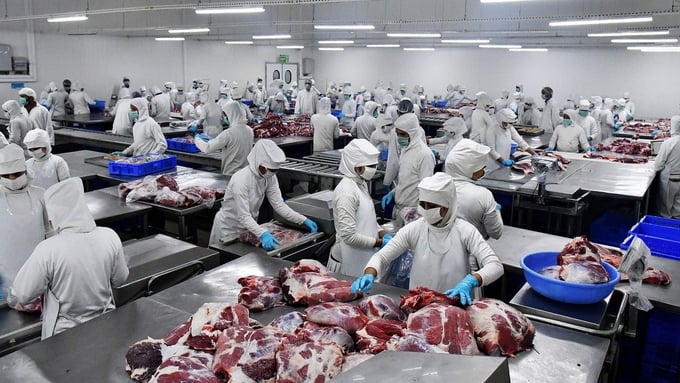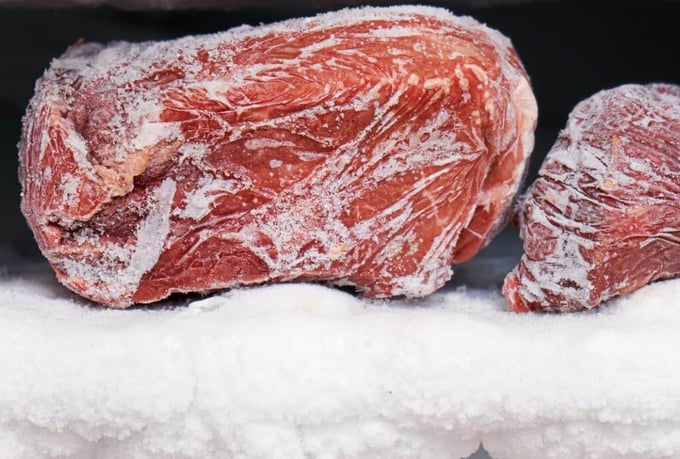December 1, 2025 | 08:55 GMT +7
December 1, 2025 | 08:55 GMT +7
Hotline: 0913.378.918
December 1, 2025 | 08:55 GMT +7
Hotline: 0913.378.918

According to statistical data, India is the largest meat supplier to Vietnam, with a total export volume of over 102,000 tons, accounting for 25.3% of Vietnam's total imports. This is an increase of 17.5% compared to 2023. Photo: TT.
During the first seven months of 2024, Vietnam imported over 450,000 tons of meat and animal by-products for food, which is an increase of 6.4% compared to the corresponding period in 2023.
Notably, meat products accounted for more than 320,000 tons, representing an increase of over 40%. These figures reflect the sustained demand for imported meat in Vietnam, despite the significant challenges facing the domestic livestock industry.
India stands as the largest meat supplier to Vietnam, with a total export volume of over 102,000 tons, accounting for 25.3% of Vietnam's total imports. This is an increase of 17.5% compared to 2023. Following India are the United States, Russia, Germany, and South Korea, which constitute 13.5%, 11.7%, 7.7%, and 7.57% of Vietnam’s total meat imports, respectively. Although several countries, such as the United States and Russia, experienced slight declines in exports, India and Germany saw significant growth.
However, the key issue lies not only in the volume but also in the quality of imported meat products. According to the Department of Animal Health (Ministry of Agriculture and Rural Development), following the enforcement of Circular No. 04/2024/TT-BNNPTNT on May 16, 2024, 55 out of the 6,679 examined shipments tested positive for Salmonella, accounting for nearly 1% of Vietnam's total meat import volume.
In the absence of Salmonella testing, the Vietnamese market can potentially be exposed to over 1,319 tons of contaminated animal meat. Consequently, contaminated meat products pose a high risk of disease outbreaks, food safety concerns, and threats to the health of Vietnamese consumers.
Vietnam's import quarantine process currently complies with legal regulations, with Salmonella-negative shipments requiring only one to three days to finalize procedures, whereas Salmonella-positive shipments require five to six days. Nonetheless, major exporting countries such as the United States, Australia, France, and South Korea have expressed concerns over Circular No. 04, suggesting that the new regulations can significantly challenge meat imports into Vietnam.
In response to these concerns, a representative from the Department of Animal Health affirmed that Circular No. 04 fully complies with international standards without posing as an obstacle to import businesses.
Between May and June 2024, Vietnam imported 59,461 tons of meat and meat products, a figure comparable to the corresponding period in 2023. This growth indicates that Circular No. 04 has not significantly affected meat imports into Vietnam, despite ongoing objections from several countries and businesses.

Countries that are currently importing meat from Vietnam, such as the EU, the UK, South Korea, and Japan, enforce strict requirements for controlling Salmonella and E.coli bacteria. Photo: TT.
In contrast with international standards, countries importing meat from Vietnam, including the EU, the UK, South Korea, and Japan, impose strict regulations on the control of Salmonella and E.coli. Accordingly, Vietnam must comply with these requirements when exporting meat, eggs, and dairy products to the aforementioned markets.
For example, the EU prohibits the presence of Salmonella in 25 grams of meat and imposes strict limits on E.coli. Similarly, countries such as Singapore, China, and Japan impose their own regulations regarding Salmonella monitoring for meat and animal products from Vietnam.
Vietnamese businesses and associations have submitted proposals to the Prime Minister and the Ministry of Agriculture and Rural Development with the aim of increasing control over imported products and protecting local livestock industries and consumer health.
Notably, CJ Vina Agri Group in Vietnam and the Vietnam Poultry Association have petitioned the government to implement measures with the goal of preventing the importation of undesirable livestock products, while also establishing technical barriers to protect the domestic market.
However, the importation of meat and animal products into Vietnam remains an unavoidable necessity against the background of global economic integration and the rising consumer demand.
As a result, quarantine measures, quality control, and strict compliance with international standards will be crucial in ensuring food safety and protecting consumer health. On the other hand, this initiative presents an opportunity for Vietnam to further boost domestic production, compete with imported products, and sustainably develop the livestock industry in the coming years.
Translated by Nguyen Hai Long

(VAN) The Provincial Competitiveness and Governance Index (PCGI) is a tool designed to reflect the quality of local governance.

(VAN) An environmental expert has outlined eight strategic actions for Vietnam to successfully meet its commitment to achieve Net Zero emissions by 2050.

(VAN) After the institutional merger, Da Nang possesses significant forest-carbon reserves and is proactively engaging in the carbon market, creating a new revenue stream.

(VAN) An Giang strengthens communication against IUU fishing, increases inspections and sanctions, and is determined to remove the EC’s “yellow card” while developing a sustainable fisheries sector.

(VAN) As green transition becomes a global trajectory, Viet Nam’s biggest challenge is not only technology and models, but how to ensure that capital flows reach the right beneficiaries.

(VAN) The Ministry of Agriculture and Environment must spearhead the construction of green governance, spanning decision-making processes and investment standards to policy evaluation mechanisms.

(VAN) The Agriculture and Environment sector of Khanh Hoa has achieved numerous milestones over the past 80 years, contributing significantly to the goal of establishing the province as a centrally governed city by 2030.